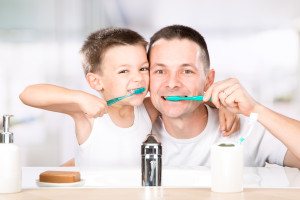 Prevention. The concept is so important to our health, we gave it two names: preventive and preventative health care. And while there’s no real preference for which alternative spelling you use, health care providers care a lot about implementing its core principles.
Prevention. The concept is so important to our health, we gave it two names: preventive and preventative health care. And while there’s no real preference for which alternative spelling you use, health care providers care a lot about implementing its core principles.
In dental health, one area of prevention that gets overlooked involves early childhood. Children always lose their first set of teeth and children sometimes fear going to the dentist. On first blush, perhaps this oversight seems benign. It’s not.
Baby teeth may go away before you turn double digits, but they are very important for both speaking and chewing. And since they will get replaced eventually, baby teeth with cavities sometimes go unfilled by parents who are unaware of the consequences. Specifically, if ECC (early childhood caries/cavities) causes your child to lose teeth too early, your child’s permanent teeth may come in crooked or crowded. That means being cavity-free early in life is mission critical to proper mental and physical development.
Spotting ECC
Early childhood caries are cavities that most often show up on a child’s upper front teeth, but they can affect other teeth, too. What first shows up is white spots near the gum line. As it worsens, they can look like brown spots, holes or broken teeth. Early childhood dentist appointments are important because these spots are hard to see at first. When not caught early, the are hard to be stopped from progressing into cavities.
Healthline.com provides the following signs indicating a possible ECC:
- Dark spots on the tooth
- White spots on the tooth
- Crying or fussiness
- Sensitivity to cold foods or drinks
- Mouth swelling
- Avoiding food
- Lethargy
Preventing ECC
Early Childhood Caries happen when sugar, from foods/liquids like milk and juice, are left in your child’s mouth for many hours. Children love sugar, and bacteria love sugar too. Bacteria also uses it to make the acids that destroy teeth.
One of the easiest ways to prevent caries is not putting your child to bed with a bottle filled with milk, formula, juice or other sweet liquids. According to the American Academy of Pediatrics, most children who are seven or eight months of age no longer need to feed during the night. In the event your child must have a bottle to go to sleep, slowly dilute the milk or juice with water over a few weeks until your child is only drinking water.
Other prevention methods recommended by Children’s Hospital Los Angeles include:
- Only giving your child a bottle during meals.
- Do not allow your child to walk around with it or drink from it throughout the day.
- Adopting a healthy balanced diet for your child and limiting starchy, sugary snacks and sugary drinks.
- Cleaning your baby’s gums with a soft toothbrush or cloth and water starting at birth; once their first tooth erupts, use a soft toothbrush twice a day.
- Use a “smear” of toothpaste if your child is under two years of age and a “pea-size” amount if they are between two and five years of age; the use of fluoridated toothpaste is dictated by your child’s caries risk, as determined by the dental or medical provider
- Not dipping pacifiers in any sweetened liquid.
- Teaching your child to start drinking from a cup as early as possible, preferably before they turn one year of age. By drinking from a cup, the liquid is less likely to pool around the front teeth.
- Take your child to a pediatric dentist for an early evaluation by their first birthday. The pediatric dentist will discuss the risk of your child developing cavities and the best way to prevent them.
Cavities occur when the hygiene we practice is overcome by the food we eat. So, a big ounce of prevention should come in the form of watching what we eat. Chances are your child has a sweet tooth, so work into your child’s diet some healthier alternatives to satisfy their cravings. Alternatives to cake, ice cream, cookies, candy and other kid favorites include:
- Low glycemic fruits (blackberries, blueberries, and raspberries)
- Trail mix, with nuts
- Yogurt
- Frozen bananas
- Cheese sticks
- Unsweetened applesauce
- Dried fruits with no sugar added
- Carrots and dip
- Granola bars
Tackling Trauma
Early childhood is when kids start to take interest in sports and other activities. A common dental health issue as kids become teens and teens become adults is trauma to one’s head, neck, mouth and jaw. If your child plays a sport, don’t assume they aren’t big and fast enough to suffer a trauma that can cause significant health and dental problems. Wear helmets, mouthguards and anything else that increases the safety of a sport. Your child and your dental bills will thank you later.







Leave a Reply